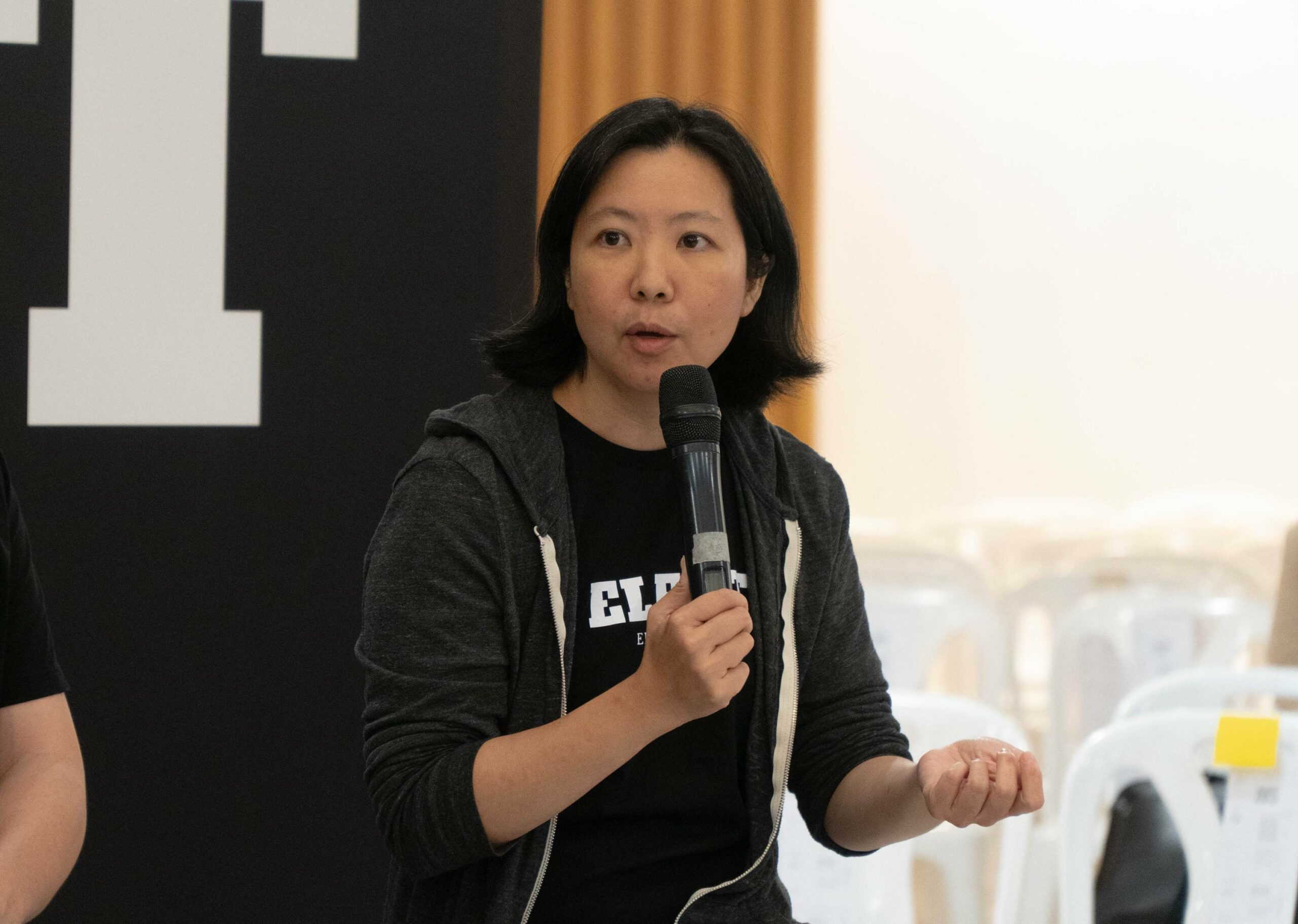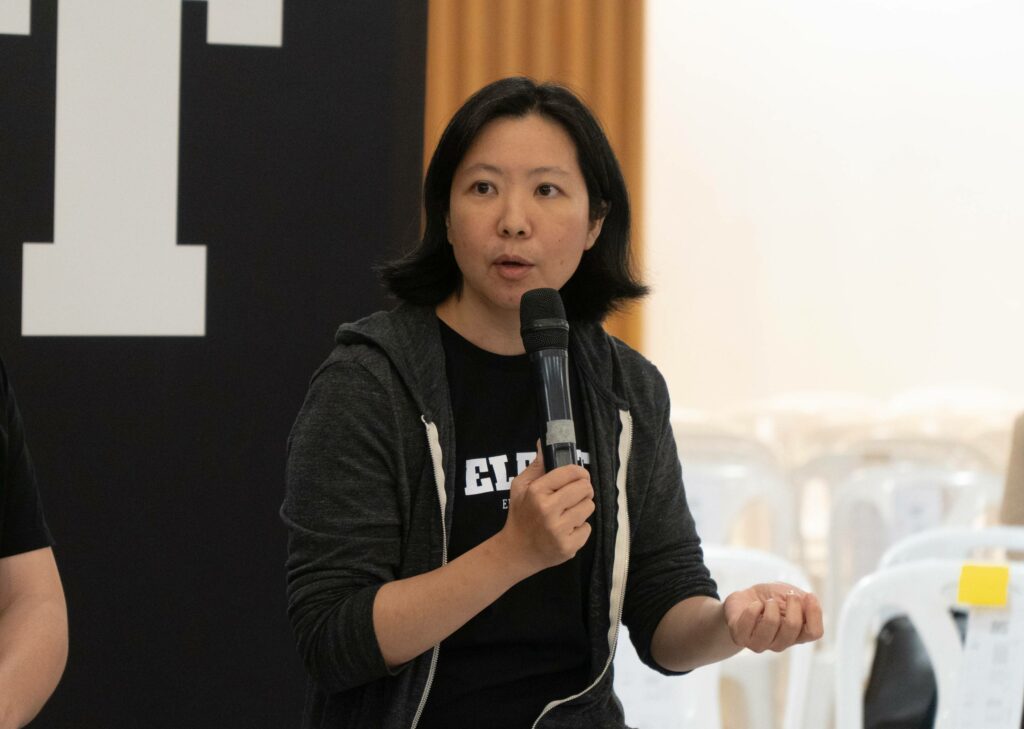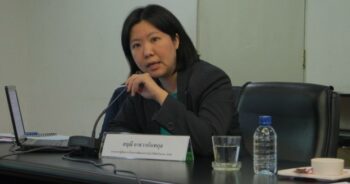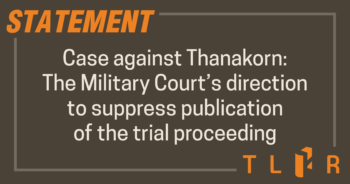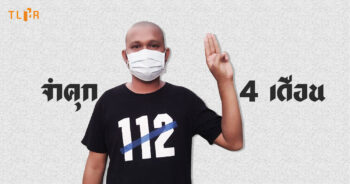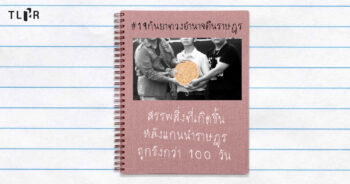On 28 August 2019, Ms. Sarinee Achavanuntakul, writer, translator, researcher and financial expert was summoned by the Supreme Court to give a statement regarding a contempt of court charge. She is scheduled to testify in court on 9th September at 10.30am. The summon came after she wrote an opinion piece in the Krungthep Turakit newspaper on 14th May earlier this year. The article she wrote is titled “The Perils of Excessive Rule of Law (revisited), Case of Media Shareholding by MP Candidates”. (“อันตรายภาวะนิติศาสตร์ล้นเกิน (อีกที) กรณีหุ้นสื่อของผู้สมัคร สส”)
Mr. Supradit Jeensawake, the Secretary of the Election Cases Division of the Supreme Court, conducted a memorandum, which was attached the summon, to propose the Chief of the Election Cases Division of the Supreme Court for approving the testimony proceeding of Ms. Sarinee. As a result of the publication, she wrote caused damaged to the court by criticizing the court decision in the Krungthep Turakit newspaper.
According to Mr. Supradit, the article caused damage to the court and accused the court of being careless in adjudicating the case. In the article, Ms. Sarinee cited a case in which the court banned an MP candidate from running in an election as an example of the dangers of excessive use of rule of law. Section 48(3) of the 2017 Constitution and Section 42(3) of the 2018 Organic Law on Election of Member of the House of Representatives, which prohibits any owner or shareholder of media and/or publishing firms from being an MP candidate.
“In fact, the candidate has shares in a business which has nothing to do with running a newspapers or media. But because his company was on the list of businesses with the words ‘broadcasting and television business’, the court had decided to disqualify him. The writer called this a ‘careless’ (“mak-ngai” in Thai) interpretation and very dangerous,” Mr. Supradit wrote in the memo.
He continually said the article accused the Court of interpreting the law consider the facts but not considering the intention of the law; this counted as a good example of “the excessive rule of law”, meaning unremitting (“ta-phud-ta-phu” in Thai) excessive used of law. According to him, the writer did not criticize the Court in good faith but in a dishonest manner and gave a biased and inaccurate report of the verdict. This criticism of the Court is thus considered a contempt of court, given the fact that it is the Court’s duty to try and make decisions on cases related to MPs’ qualifications.
“…the article therefore has an influence over public sentiment, or sets itself above the court, or over the litigants, or over the witness during the sensitive trial period of a case involving disqualification of an MP. In future, there may be more cases like this, which may spark similar criticisms to those the writer wrote in her column”,
an excerpt from the memo read.
In filing this case, Mr. Supradit specified who should be on the panel of judges. He specifically asked Mr. Chantawat Voratat, a Senior Judge of the Supreme Court, to supervise the case, while Mr. Panlert Boonliang, Chief Justice of the Supreme Court, and Mr. Chaichana Tanjapatkul a Supreme Court judge, will be on the panel. The Chief of Supreme Court of the Election Cases Division agreed to this proposal. As a result, summons was sent to Ms. Sarinee as a writer including a news editor of Krungthep Turakit newspaper for testimony on 9th September 2019 at 10.30am at Courtroom 2 Room 208 of the Supreme Court.
This week there have already been three related contempt of court cases. Mr. Chaowana Traimas, Secretary-General of the Office of the Constitutional Court, summoned political scientist Professor Kovit Wongsurawat for questioning at 10.00am on 30th August regarding his tweet in July commenting on the Constitutional Court’s decision to accept a petition against 32 government coalition MPs but sparing them from a suspension of duty. He tweeted that the decision of the Constitutional Court was callous (“dan” in Thai). Captain Songklod Cheunchoopol, aka “Captain Pukhem,” said he would report a case to the police in the contempt of the court offense alleged Mr. Yutthalert Sippapak, a film director, regarding his re-tweet post of such Professor Kowit post.
Offence of Contempt of Court
Section 32 of Thai Civil Procedure Code states that whoever is the author, editor or publisher of any newspaper or printed matter published to the public shall, irrespective of whether he knew of the contents or publication of such newspaper or such printed matter, be said to have committed a contempt of Court in either of the two following cases:
- […]
- When such newspaper or printed matter, during a trial of a case up to final judgement, contains or expresses in any way whatsoever any information or opinion intended to influence the public sentiment or the Court or any party or witness in the case, which appears likely to prejudice the fair of such case, such as:
- A misrepresentation of the facts of the case, or
- A biased and inaccurate report, summary or comment of the proceedings of the case, or
- An unfair comment on the conduct of the case by a party or on the evidence or character of a party or witness, including a statement of facts prejudicial to the reputation of such party or witness even though the same be true, or
- An inducement to committing perjury.
For the purpose of this Section, the definitions in Section 4 of the Press Act., B.E. 2476 shall apply.
__________________________________
Unofficial Translation Summons If summons cannot be served personally, affix the summons at the office or residence of the recipient in an easily sighted area. Service of summons deemed valid immediately upon service. Service of summons deemed valid immediately upon service Official Emblem Black Case No. Lor Or 1/2562 In the Name of His Majesty the King Day 21 Month August Buddhist Era 2562 Civil Matter (Contempt of Court) Between Mr. Supradit Jeensawake as the Secretary of the Election Cases Division the Accuser of the Supreme Court To Miss Sarinee Achavanuntakul, the First Accused Whereas there appears on Krungthep Turakit newspaper on Tuesday, May 14th, 2019, page 9, column Citizens 2.0 (‘Pra-Cha-Chon 2.0’), a publication of an article titled “Perils of Excessive Rule of Law (revisited), Case of Media Shareholding by MP Candidates”, you are hereby required to appear and give testimony on the aforementioned matter on September 9, 2019 at 10.30 am at Court Room No.2, Room 208, The Supreme Court.
………………………………………………………..Judge (Mr. Chantawat Woratat) Election Division Cases of the Supreme Court Tel 0 2220 3483-84 |
Unofficial Translation MEMORANDUM Department: The Supreme Court’s Election Cases Division Tel: 24540-41 No. Date: August 16th, 2019 Reference: Commencement of Contempt of Court Proceedings To: President of the Election Cases Division of the Supreme Court I would like to inform you about an article titled “Perils of Excessive Rule of Law (revisited), Case of Media Shareholding by MP candidates”, published in Krungthep Turakit newspaper on Tuesday, May 14th, 2019, page 9, in the Citizens 2.0 (‘Pra-Cha-Chon 2.0’) column as enclosed in Appendix 1. The article alluded to the Supreme Court’s Election Cases Division, which contained the following passages: “…An example of the danger of this duality which I demonstrated in the previous section relates to a case in which the Supreme Court’s Election Cases Division banned a Future Forward Party (FFP)’s MP candidate from Sakon Nakhon province in March 2019. Surprisingly, the court interpreted that since the list of business objectives (which is a standard form for company registration that can include a number of business objectives although a company does not have to actually operate such businesses) contained words related to a mass media business, such as “broadcasting and television business”, the MP candidate was interpreted to be “an owner or a shareholder of a newspaper or mass media business”, which was the grounds for disqualification as an MP candidate according to Thailand’s Constitution of 2017 (B.E. 2560). I think such interpretation is careless (“muk-ngai” in Thai) and extremely dangerous since made a blanket conclusion that an “objective” is the same as an “actual business operation” without considering the facts and the intention of the law. Based on such careless interpretation, there is nothing to guarantee that an MP candidate who bought shares of SET-listed companies or invested in a mutual fund that purchased listed companies would not be disqualified because a large number of listed companies included mass media as one of their business objectives, when in fact these companies are engaged in other lines of business unrelated to mass media, such as supermarkets. Based on such careless interpretation, many ordinary matters would automatically violate the law. For example, we could interpret that merely having a knife in the kitchen of one’s home is equivalent to taking that knife and stabbing another person. Therefore, possession of knives in one’s home is against the law. The ruling of the Supreme Court’s Election Cases Division in the aforementioned case can therefore be counted as a good example of “the excessive rule of law”, meaning the unremitting (“ta-phud-ta-phu” in Thai) excessive interpretation of the letter of the law by considering the facts but not considering the intention of the law…” In my interpretation, the article published in Krungthep Turakit newspaper on Tuesday, May 14th, 2019, page 9, “Perils of Excessive Rule of Law (revisited), Case of Media Shareholding by MP candidates” column, written or authored by Ms. Sarinee Achavanuntakul, criticized the Supreme Court’s Election Cases Division as careless in interpreting the law regarding the prohibition of the right to stand for election for a Member of Parliament of the House of Representatives on the grounds that a candidate is an owner or a shareholder in any newspaper or mass media business according to Section 98(3) of the 2017 (B.E. 2560) Constitution and Section 42(3) of the 2018 (B.E. 2561) Organic Law on Election of Members of the House of Representatives. The interpretation of the law extended to an owner or a shareholder of a limited partnership or a company that includes any newspaper or mass media business as one of the business objectives in a memorandum of association. Although in practice, such company does not operate any newspaper or mass media business, the Supreme Court’s Election Cases Division interpreted the candidate as being an owner or a shareholder of a company operating a newspaper or mass media business. The author offered the opinion that this interpretation was careless and extremely dangerous. In addition, the aforementioned article condemned the Supreme Court’s Election Cases Division for its unremitting careless interpretation of the law which considered the facts without considering the intention of the law. The author did not criticize the Supreme Court’s Election Cases Division in good faith but intended to attack or rebuke the Supreme Court’s Election Cases Division interpretation of the law as unremittingly careless. According to the 2002 (B.E. 2545) Royal Institute Dictionary, the word “muk-ngai” (มักง่าย) means “having the habit of being negligent.” [To use] It is analogous to saying that the Supreme Court’s Election Cases Division simply interpreted that if there were business objectives indicated in the memorandum of association [regarding newspaper or mass media businesses], then it [the application to be an MP] was unlawful, without the court distinguishing the fact of whether they had actually done so or not. But there is another explanation of the word in the 1999 (B.E. 2542) Royal Institute Dictionary. “Muk-ngai” consists of two words: “muk” means “being inclined” and “ngai” means “simple.” The 1999 Royal Institute Dictionary provides the meaning of “muk-ngai” as “having the habit of being negligent” to refer to a person who is not meticulous; such a person often refuses to do things that require perseverance and accuracy, but prefers to be sloppy just to finish the tasks without considering the adverse impact inflicted on others. In addition, the Dictionary compiled by Professor Plueang Na Nakhon defines the word “muk-ngai” as having the habit of being negligent in a sense that implies carelessness. Being careless means having a tendency of doing things incorrectly. The article is a criticism of the Supreme Court’s Election Cases Division that it simply considered the business objectives listed in a memorandum of association and concluded that the MP candidate was an owner or a shareholder of a limited partnership or a company that operates a newspaper or mass media business, without considering whether the limited partnership or the company actually operates that line of business in practice. It demonstrated the misconduct of the Supreme Court’s Election Cases Division and its neglect of troubles caused to others. As for the word, “ta-phud-ta-phu” (ตะพดึ ตะ พื อ) , the 2002 (B.E. 2545) Royal Institute Dictionary gives the meaning as unremitting, continuous, for example, unremitting work. The article accused the Supreme Court’s Election Cases Division of unremittingly using the law, implying that the Supreme Court’s Election Cases Division has continuously misinterpreted the law without considering the troubles inflicted on others. My opinion is that the content which the author mentioned or illustrated in the said newspaper is inaccurate: accusing the Supreme Court’s Election Cases Division of interpreting the law “carelessly” and using the law “unremittingly”, and over-interpreting the texts without considering the intention of the law. The author’s accusation is a biased and inaccurate description of legal procedure and is an unfair criticism that disparages the Supreme Court. Since the Supreme Court’s Election Cases Division has the authority to consider and reach a verdict on the right to stand for an election of members of the House of Representatives (cases related to MP candidates’ qualification) according to Thailand’s Constitution and the 2018 (B.E. 2561) organic law on the election of members of the House of Representatives. That the author wrote the article therefore has influence over public sentiment, or over the court, or over litigants, or over witnesses during other future court trials related to the right to stand for election to the House of Representatives, which may involve the same issue that the author mentioned or expressed in the article. The article is not an academic analysis of a final verdict of the Supreme Court’s Election Cases Division since the use of the words, “muk-ngai” and “ta-phud-ta-phu” are not academic, but has the sole purpose of disparagement. How can the author know that the Supreme Court’s Election Cases Division interpreted the law “carelessly” and has used the law “unremittingly”? This constitutes contempt of court pursuant to Section 32(2) of the Civil Procedure Code. In addition, Mr. Yuttana Nuanjarut, news editor of Krungthep Turakit newspaper, as in Appendix 3, , is the person responsible for producing and supervising the newspaper’s content according to the definition in the 2007 (B.E. 2550) Printing Recordation Act. The editor therefore is a co-principal with the writer in the commission of the crime pursuant to Section 83 of the Criminal Code. It is therefore my view that it should be proposed that the President of the Election Cases Division of the Supreme Court should order a panel of judges to conduct and inquiry and rule on the matter of contempt of court. I propose that this panel consist of Mr. Chantawat Woratat, Senior Justice of the Supreme Court, as the Chief Judge, and Mr. Panlert Boonleang, Presiding Justice of the Supreme Court and Mr. Chaichana Tanjapatkul, Justice of the Supreme Court, as members of the panel. Please kindly consider the proposal. If you agree, I will swiftly proceed accordingly. (Supradit Jeensawake) I agree to the proposal (Jinda Pantachote) Copy Certified (Supradit Jeensawake) |
